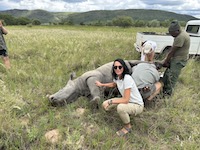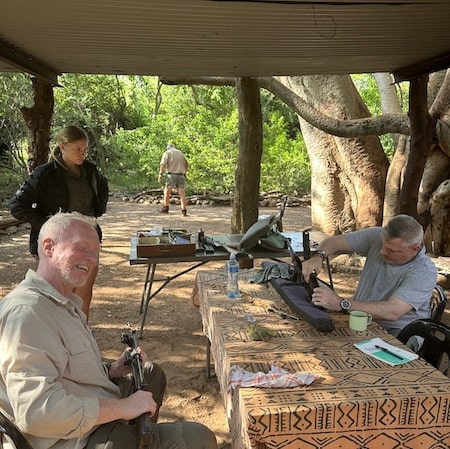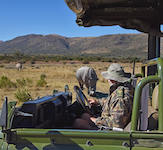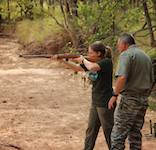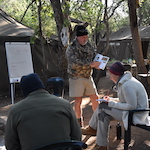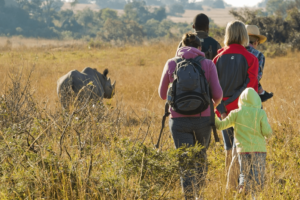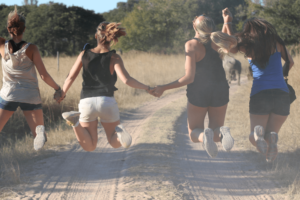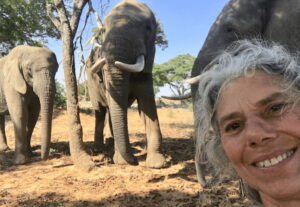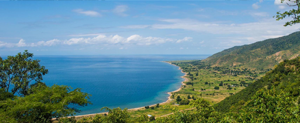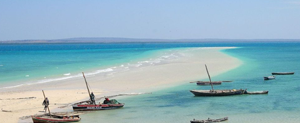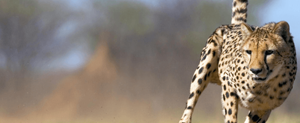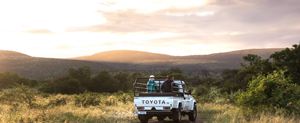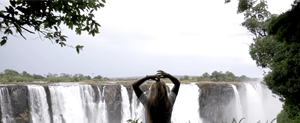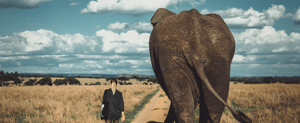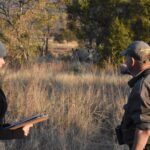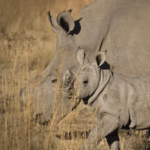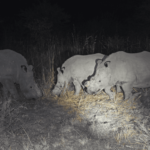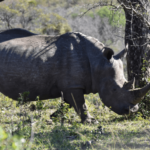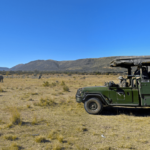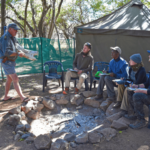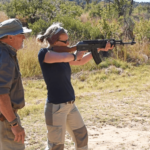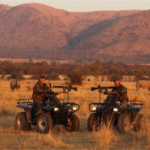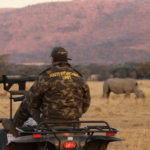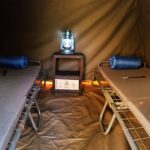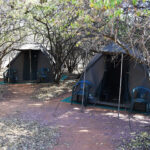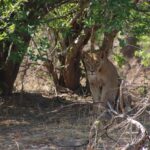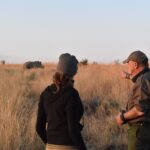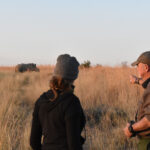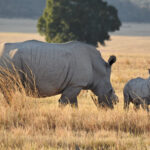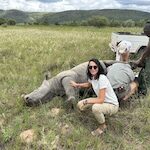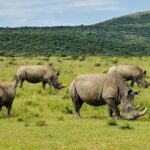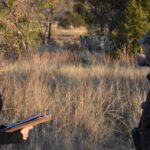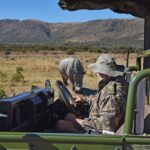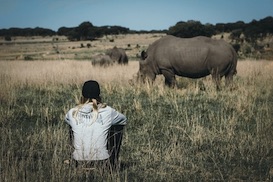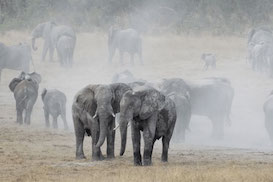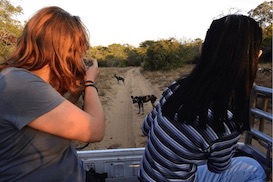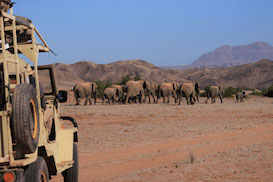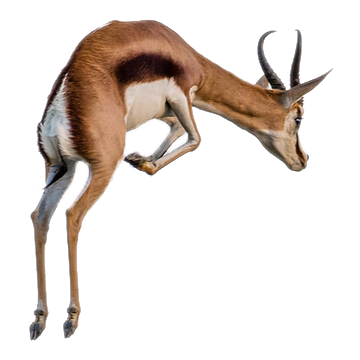Wildlife Warriors – Conservation &
Anti-Poaching Volunteer Training
SOUTH AFRICA
South Africa
7 - 14 days
Flexible
Up to 8 people
Age 18+
From $1,395
South Africa
7-14 days
Flexible
Flexible
Up to 8 people
Max 8
Age 18+
From $1,395
What's the project about?
Rhino poaching in South Africa has increased 10-fold during the last decade, and the rhino again faces mass extinction. This Conservation & Anti-Poaching Training Programme is run by one of the most experienced and decorated rangers in southern Africa, who is a recognised anti-poaching expert. This anti-poaching course in South Africa gives participants an understanding of conservation challenges, strategies and ethics. You will learn practical anti-poaching techniques in one of South Africa’s finest wilderness areas.
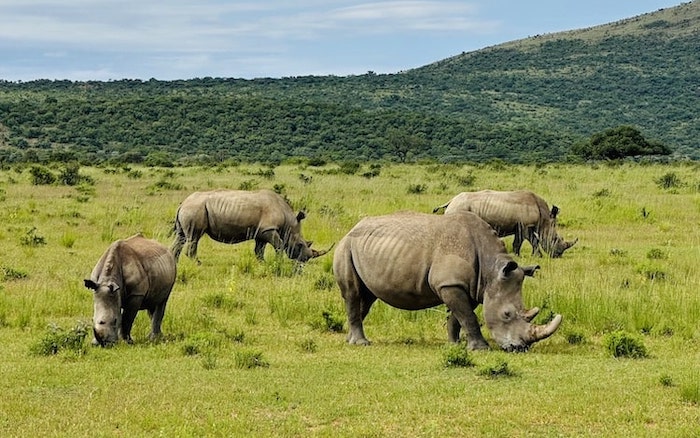
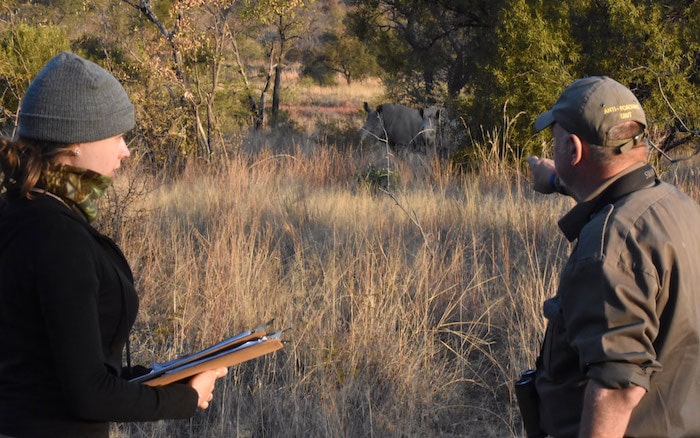
What will I be doing as an anti-poaching volunteer?
What makes this project ethical?
Your instructor and rangers are participants in the front-line poaching fight in South Africa. Your participation in the course allows these rangers to continue their battle against the illegal trade of protected wildlife. By participating in this anti-poaching course, you are contributing to the protection of Africa’s endangered wildlife. As an anti-poaching volunteer, you’ll learn about the economic and environmental impacts of poaching, and experience counter-measures to prevent poachers from targeting wildlife.
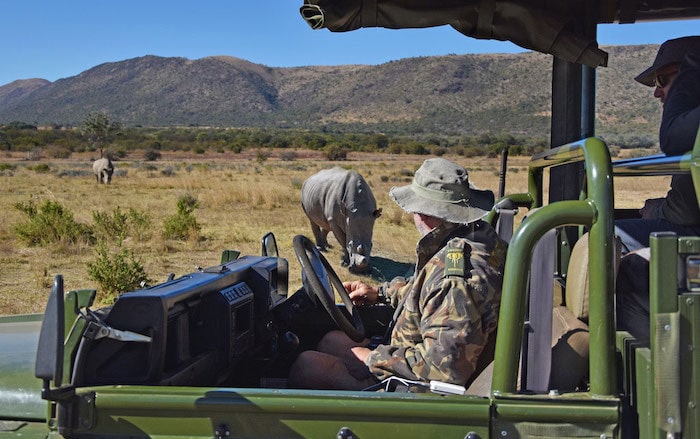
Project showreel
Project gallery
Anti-Poaching Training Course information
The anti-poaching course is 80% practical, so the vast majority of your time is spent in the field, learning first hand about the environment and wildlife around you.
Learn about all aspects of poaching, including the illegal bushmeat, ivory and rhino horn trades, and about the economic factors involved in small and large scale poaching.
The course covers:
Wildlife identification and tracking
Anti-Poaching volunteers will carry out foot and vehicle monitoring, both during daytime and on night drives. You will undertake some or all of the following activities:
- Big game and mammal identification and behaviour studies.
- Learn big game tracking skills, focusing on rhino tracking.
- Learn human tracking skills and carry out practical exercises.
- Tracks and spoor identification.
- Understand the signs of animals and humans in the bush.
- Monitor the movement of endangered and threatened species.
- Bird and reptile identification and behaviour studies.
Anti-Poaching training
- Develop an understanding of poachers and the poaching industry – learn about what has driven the increase in large animal poaching in recent years and what can be done to counter it.
- Anti-poaching techniques and patrol procedures – learn about patrol planning, identifying poaching hotspots, the art of camouflage and surveillance, and ambush planning.
- Learn day and night navigation skills.
- Firearms handling.
Plus
- Ecology – learn about the relationships between plants and animals, and the impact of one on the other. Study the different ecosystems in the area and learn about the distribution of wildlife.
- Conservation practices.
- Wildlife law.
- Basic first aid and snake bite treatment.
At the end of the course you will receive a certificate of participation recognised by the South African Police Service (SAPS) and the International Anti-Poaching Foundation (IAPF).
Our 10-day anti-anti-poaching course itinerary is below. Longer courses follow the same basic itinerary, except topics are covered in more detail. The shorter seven day anti-poaching course gives a broader overview of each module
Day 1
Meet your instructor and the other members of your group. You will be met at Centurion Gautrain station, about 20 minutes north of the airport. Please aim to arrive before midday. From there you will transfer by car to base camp, in the Waterberg region of South Africa (approximately 4-5 hours by car).
Afternoon: Orientation, briefing and welcome.
Days 2 to 10
Morning – game drive and course overview.
The course will include a mixture of classroom learning, (bear in mind your classroom could be a chair under a tree, or around the fire!) and practical field work in the bush. The programme is very hands-on and you should be prepared for lots of foot-based tracking and walking across different terrain. Some nights you will go on a night patrol, and there may be early mornings for big game tracking.
At the end of the course there will be a short exam to recap all you have learnt, and a certificate presentation, followed by a farewell dinner.
Day 10
After breakfast, you will be transferred back to Johannesburg in time for your return flight or onward travel from O.R. Tambo Airport.
When can I join?
Courses run throughout the year, including Christmas and New Year. Dates are flexible to suit, but solo travellers may be asked to join an existing group if possible. Please let us know what works best for you!
Project pricing:
**SPECIAL OFFER – SAVE 10% ON BOOKINGS MADE BEFORE 1st JUNE 2024! Travel can be any time in 2024.**
7-day – $1,395 – special offer price $1,255.50
10 day – $1,950 – special offer price $1,755
14 day – $2,395 – special offer price $2,155.50
All prices are in USD. Please enquire if you have a group of more than four people.
What’s included in the cost?
- Course fee: this goes straight to our project partner and contributes to their running costs – enabling them to continue funding their anti-poaching operations
- Accommodation and three meals per day
- Return transfers (from Centurion station in Johannesburg)
- Comprehensive instruction – the course is conducted by a highly qualified South African Special Forces expert
- Certification – the course is recognised by the South African Police Service and the IAPF
- Conservation levy (paid directly to the reserves where you are based)
- Full orientation and supervision
- Equipment and materials required to do your work
What’s not included?
- Flights or travel to Johannesburg, South Africa
- Visa fees (variable depending on nationality)
- Travel insurance (compulsory)
- Personal expenses such as souvenirs, drinks, snacks, activities
- Additional excursions
- Local SIM card and data/airtime bundles (optional)
- Administration fee ($40)
** Special offer terms and conditions:
- Offer cannot be combined with any other offer or discount given on this programme.
- Bookings must be made and deposits received between 25th March and 1st June 2024.
- Projects must start in 2024.
- New bookings only.
View our booking terms and conditions.
You will stay in the heart of the African bush in a permanent tented camp., The military-style camp is basic but comfortable. Each tent has two beds with mattresses and pillows, and a small area for storage. Participants should bring their own sleeping bag, and we recommend bringing a liner as well, especially during winter. There are shared ablutions, hot and cold running water and flush toilets.
The camp is unfenced and allows the free movement of animals such as rhino, buffalo, hyena and even leopard, who have been known to roam through the camp.
You will receive three meals per day during your stay, prepared for you by the camp’s resident chef. Tea and coffee are available throughout the day, plus juice and water. The camp has limited access to other drinks, but alcohol is available in moderation at an extra cost. Any snacks should be purchased before your departure from Johannesburg.
There is no electricity in the camp, but should you need to charge phones or cameras, this can be done occasionally at the main camp, about 2km away. There is also WiFi at the main camp if required in an emergency, and there is usually 3G phone signal in the area. However, we say, it’s the perfect time to get away from it all and enjoy being off grid!
“The accommodation was perfect and very convenient. Great food. Even hot showers, even proper toilets, flushing, walls and doors and curtains for some privacy. Definitely something I did not expect being in the middle of the bush!”
Our anti-poaching programme gives volunteers an in-depth understanding of conservation strategies, ethics and practices. You will gain experience of the critical environmental factors involved in successful wildlife protection and long term conservation, focusing on South Africa’s iconic and endangered rhino population.
The goal is to share an appreciation for the challenges facing those who dedicate their lives to anti-poaching, and for you to gain an in-depth understanding of what it takes to protect wildlife.
This is a short but immersive wildlife course based in the heart of the African bush, where you have the opportunity to learn about the conservation and protection of vulnerable species.
Project Background
Poaching of Africa’s rhinos increased 10-fold between 2001 and 2016, and once again this ancient animal faces extinction. This makes the work of anti-poaching organizations, and the need to apprehend poachers, more important than ever. In 2007 there were just 13 rhino poached in South Africa; by the end of 2017 that number had risen to 1,028, with the illegal killing of rhinos spreading from South Africa into neighbouring Mozambique, Zimbabwe and Namibia.
Increasingly, private organisations and individuals are supporting the Department of Environmental Affairs in focusing on rhino protection and security, in the hope that the species may be left in peace to thrive once again.
This anti-poaching course is based in the game-rich Waterberg region of Limpopo, in northern South Africa (approximately 4 hours north of Johannesburg). The region is home to a variety of big game including white rhino, leopard, hyena, buffalo, giraffe, wildebeest and a variety of antelope. You will study a huge range of mammals, birds and reptiles in their natural environment.
Your anti-poaching instructor
The Bush School has been running for more than 20 years, and your instructor has more than 30 years of experience in specialist anti-poaching training and guiding. His experience, qualifications and training are the culmination of decades of learning during his time in the South African Special Forces and South African Police Service. His specialist area of knowledge is dangerous game, and he has instructed on bush survival and anti-poaching courses for many years. His bush school is accredited by the South African Wildlife Society and the Department of Environmental Affairs, and all staff are leading training providers, responsible for the instruction and ongoing advanced training of ranger units, conservationists and students from around the globe.
Who should join this course?
No wildlife experience is necessary, but a passion for the outdoors, an adventurous spirit and a desire to learn about the protection of endangered and vulnerable animals are required. You should be able to communicate reasonably well in spoken English.
The course is perfect for bush craft companies, youth groups or individuals who want an adventurous and educational international experience. The course has previously accommodated groups of scouts and cadets, school and college students, ex-military groups, rugby teams and private companies. The course can be tailored to suit the age range, skill level and interests of particular groups.
What special equipment do I need to bring?
Please bring a sleeping bag and liner and 1-2 litre re-usable water bottle (not glass!). A good pair of binoculars and a bird book are also useful, plus a small rucksack / daypack for carrying your water and other items during days out in the bush.
How fit do I need to be?
There is a fair amount of foot-based tracking and hiking through different terrains. A moderate level of fitness and all-round good health will make your time more comfortable.
How old do I need to be?
The minimum volunteering age for solo travellers is 18 years. Student and youth groups can be catered for on a bespoke programme. Families are also very welcome, and we suggest that the course is best suited for children aged over 12 years. There is no upper age limit, but for volunteers aged over 65, we do require your medical form to be signed by a doctor.
How many people will there be?
Individual students and groups of all sizes can be catered for. If your group is larger than 10 people, additional instructors may be required to provide adequate attention and supervision. Solo travellers are extremely welcome, as are groups and families.
When can I join?
Start dates are flexible throughout the year. The project runs year-round, including Christmas and New Year. We advise that participants arrive in Johannesburg the day before their course starts. We can recommend a number of convenient accommodation options.
When is the best time to volunteer in South Africa?
Summer is from October to March when average high temperatures in the Pilannesberg can regularly be over 30oC and days can be humid. The highest rainfall is in December and January when you get spectacular thunder and lightning shows. Winter months of April – September are dry, with bright, clear sunny days and cooler evenings. Nights in June – August are particularly cold, with temperatures dropping to around 5-7oC. Game viewing is at its best during the winter months, as animals move in search of water and the bush thins out. More information on volunteering in South Africa can be found here.
What animals will I encounter?
The Waterberg region of Limpopo is an area teeming with wildlife and home to spectacular scenery. The isolated nature of the plateau makes it an ideal refuge for threatened species, and the area is home to good numbers of black and white rhino. In addition, there are populations of giraffe, buffalo, hyena, roan and sable antelope, wildebeest, eland and kudu. Leopard and cheetah are rare sightings.
Do I get some time off?
You will get breaks during the heat of the day to relax and recharge, and your final day and a half is allocated for travelling and leisure.
How much spending money should I bring?
We recommend bringing around R1,000 in local currency to cover personal expenses such as drinks, souvenirs, snacks, tips and internet usage.
Do I need a visa?
We recommend you have at least four blank pages in your passport, and it must be valid for at least 6 months after your arrival date in South Africa. Many nationalities can get a 90-day tourist visa upon arrival into Johannesburg. However, it is your responsibility to check your visa eligibility prior to arrival.
What vaccinations do I need?
Please consult your GP or travel clinic for detailed medical advice.
Malaria – the project is regarded as a low risk malaria area, but please consult your GP for guidance.
All volunteers should make sure their Tetanus is up to date.
Please visit the UK government website for more details.
Volunteer reviews
